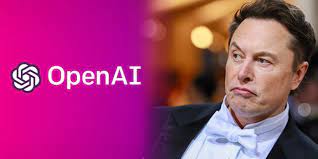
The news suggests that Elon Musk is planning to compete with OpenAI, a leading AI research institute that he co-founded, and is seeking to gather the necessary funding and personnel for the project. He may utilize resources from his various companies to speed up the process, but there are valid reasons to approach this development with skepticism.
Indirect indications of Elon Musk creating an AI company to compete with OpenAI have been circulating for quite some time, particularly since he parted ways with the organization that he co-funded in its initial years, back in 2018. Musk has been vocal about his disagreement with OpenAI’s decision to prioritize profit over pure research and their efforts to implement ethical guidelines for AI, which he appears to view as overly politically correct.
It is unclear how Musk’s view on limiting and potentially halting AI development, which is based on the belief that AI poses a risk to humanity, aligns with his current perspective on creating an AI company to compete with OpenAI. It’s possible that he has abandoned his previous stance, which has happened before as Musk has changed his views on various issues in the past for practical reasons.
Elon Musk has made a new development in his plan to compete with OpenAI by recruiting former DeepMind employee Igor Babushkin and a few other engineers to commence the project. Musk is also reaching out to his extensive network of investors and wealthy individuals to seek funding for the initiative..
The fact that individuals have been hired and there are ongoing discussions about corporate ownership of Twitter, which has recently been integrated into Musk’s “everything app” X Corp, indicates that there is some initial progress being made towards Musk’s plan to compete with OpenAI.
However, Musk may encounter challenges while attempting to establish and run a contemporary AI company, similar to his experience in managing Twitter. OpenAI’s present status is the outcome of years of experimentation, billions of dollars in investment, and the ability to attract and retain numerous machine learning experts who felt underutilized at major tech companies such as Google and Microsoft. These organizations are now struggling to keep pace with OpenAI in diverse ways. Moreover, the presence of a vast concentration of AI expertise at OpenAI and a few other institutions, not to mention in China, poses a significant barrier.
Assuming Musk secures the necessary funding to establish his AI company, his brash and unpredictable management style at Twitter and other ventures may impede his ability to recruit the numerous AI experts across multiple domains that he requires. Would top-tier AI professionals abandon their jobs at the most influential tech firms or FAANG-scale companies that are already investing heavily in the field to work for Musk?
While building and fine-tuning a large language model is becoming increasingly more accessible, the ubiquity of this technology across the tech industry creates an obstacle rather than an opportunity. If any company can do it and half the tech firms globally are already investing in the technology, why would anyone need a company like Musk’s? Even with a skeleton team, creating an alternative to GPT-4 requires more than just training the model, as demonstrated by OpenAI’s evolution into an ordinary SaaS company.
We are yet to hear the specific value proposition of Musk’s nascent AI company, but if it is linked to his criticisms of other AI companies, it may involve less top-down involvement in the technology-aided free speech process. If that is the case, then using Twitter data to train the LLM is an intriguing option, as reported by individuals familiar with the matter by the FT. Despite Musk recently claiming that Tesla’s computing resources may prove valuable in AI development, the company’s progress in the field has not kept pace with its predictions and claims.
While this venture, similar to many of Musk’s past endeavors, may fall short of expectations, it is undeniably true that his activity in an industry tends to rouse it. It’s not necessary to dethrone the industry leader to have an impact and gain influence — often all it takes is billions of dollars, something Musk appears to have at his disposal.





